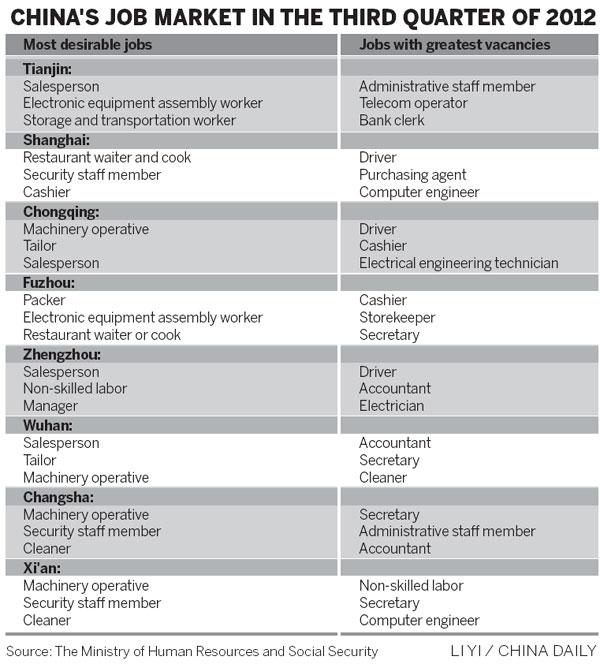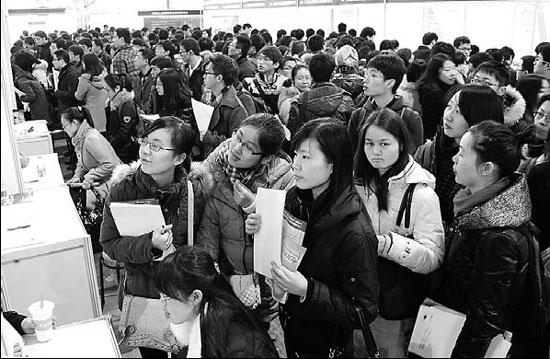Search for skilled workers moves inland
Updated: 2013-01-15 07:54
By Wang Wen (China Daily)
|
||||||||

|
Demand for human resources increased 11.3 percent in central regions and 8.6 percent in western regions in the third quarter of 2012, according to the Ministry of Human Resources and Social Security. Zhang Jiancheng / For China Daily |
Shift from coastal regions creates vacancies in central, western China
China's fast-developing economy is thirsty for talent, with skilled workers required by almost every industry.
The nation's human resources market experienced uneven development in 2012, akin to the pattern of its economic growth.
Central, western and northeastern regions of the country were expected to notch up faster GDP growth in 2012 than their eastern counterparts, according to the National Development and Reform Commission, China's top economic planning agency.
Many businesses, previously located in coastal regions, have started to move inland in the past few years, in search of lower raw material and labor costs.
The shift has also created many job vacancies in central and western China.
"It is a general trend for businesses to move to inland areas. As a result, there is a growing demand for human resources," said Zhang Hong, vice-president of Aon Hewit, a US provider of human capital and management consulting services.
Experienced managers are the most sought after group of potential hires in inland areas, which only developed a few years ago and have a small human resource pool, Zhang said.
Demand for human resources increased 11.3 percent in central regions and 8.6 percent in western regions in the third quarter of 2012, according to the Ministry of Human Resources and Social Security.
Demand declined in eastern parts of the country.
Zhang said that, due to the short supply and huge demand for human resources, wages will continue to rise in inland regions and may even exceed salaries in eastern regions.
According to the ministry, more than 80 percent of China's human resource demand was concentrated in the manufacturing, service, retail, catering and construction industries in the first three quarters of 2012.
Among the main industries, manufacturing had the greatest demand, said the ministry.
The manufacturing industry usually needs a huge number of workers, said Gong Hao, director of Aon Hewitt's payment management division in North China.
But since China's role in the global economy is changing from being the "world's factory" and its market is so important, some foreign companies have also set up research and development centers in China, and engineers are also in need.
Briand Greer, president of Aerospace Asia-Pacific of Honeywell (China), said the company planned to double the number of engineers at its Shanghai research center from the current 200.
Germany's Bayer Health Care, one of the world's largest pharmaceutical companies, enjoys double-digit annual growth in China, but also has to deal with the challenge of a shortage of talented people, including research and development engineers, sales staff and managers, said Alok Kanti, managing director of Bayer Health Care China.
Service sector
Due to the upgrading of industries, vacancies are increasing in the nation's service sector.
Sales staff, cooks and restaurant workers are among the most sought after employees in the service sector.
Cui Yansong, head chef of a Western-style restaurant in Beijing, said that he had trained more than 30 apprentices over the past two years, but only two had stayed at the restaurant.
"The new cooks want very high salaries, which we cannot afford," Cui said.
The relatively low salaries on offer in the catering industry are the major reason employers are finding it so difficult to fill vacancies.
"Recruitment is a big problem for the industry, but we do not have any solution, unless cooks' incomes could be raised," said Wang Wen, deputy secretary-general of Beijing Western Food Association.
According to the city's labor authority, the average annual income of Western-style cooks in Beijing was 35,839 yuan ($5,758) in 2011, far lower than the city's average salary of 50,415 yuan in 2010.
"Being a Western-style cook was a decent job in Beijing back in the 1980s," said Wang, who used to work at the Beijing Hotel. He pointed out that cooks working in a city's few international hotels in the 1980s got relatively higher salaries and had a great sense of job satisfaction.
But the catering industry now offers the second-lowest salary in the city, according to Beijing Statistics Bureau.
The low income leads to job discrimination and also discourages young people from joining the sector.
Yan Xishuang, dean of the Cooking Technology and Nutrition Department of Beijing Union University, said no more than 10 percent of the department's graduates end up as cooks.
As long as they can find another job, they don't want to be cooks, Yan said, pointing out that some of his former students were now secretaries or cookbook editors.
Guo Teng recently studied Western cuisine at a vocational school in Beijing, but has yet to decide whether to work in a restaurant or start his own business.
"I want to be an entrepreneur rather than a cook," Guo added.
The discrimination has already attracted the local government's attention. Raising the social status and income of skilled workers has been included in the Beijing education commission's long-term development plan as a major way to resolve the recruitment problem of vocational high schools.
Liu Jie contributed to this story.
wangwen@chinadaily.com.cn
|
A job fair in Shanghai. Due to industrial upgrading, vacancies are increasing in the nation's service sector. Yang Yi / For China Daily |

(China Daily 01/15/2013 page17)

 In Photos: 7.0-magnitude quake hits Sichuan
In Photos: 7.0-magnitude quake hits Sichuan
 Li Na on Time cover, makes influential 100 list
Li Na on Time cover, makes influential 100 list
 FBI releases photos of 2 Boston bombings suspects
FBI releases photos of 2 Boston bombings suspects
 World's wackiest hairstyles
World's wackiest hairstyles
 Sandstorms strike Northwest China
Sandstorms strike Northwest China
 Never-seen photos of Madonna on display
Never-seen photos of Madonna on display
 H7N9 outbreak linked to waterfowl migration
H7N9 outbreak linked to waterfowl migration
 Dozens feared dead in Texas plant blast
Dozens feared dead in Texas plant blast
Most Viewed
Editor's Picks

|

|

|

|

|

|
Today's Top News
Live report: 7.0-magnitude quake hits Sichuan, heavy casualties feared
Boston suspect cornered on boat
Cross-talk artist helps to spread the word
'Green' awareness levels drop in Beijing
Palace Museum spruces up
First couple on Time's list of most influential
H7N9 flu transmission studied
Trading channels 'need to broaden'
US Weekly

|

|









